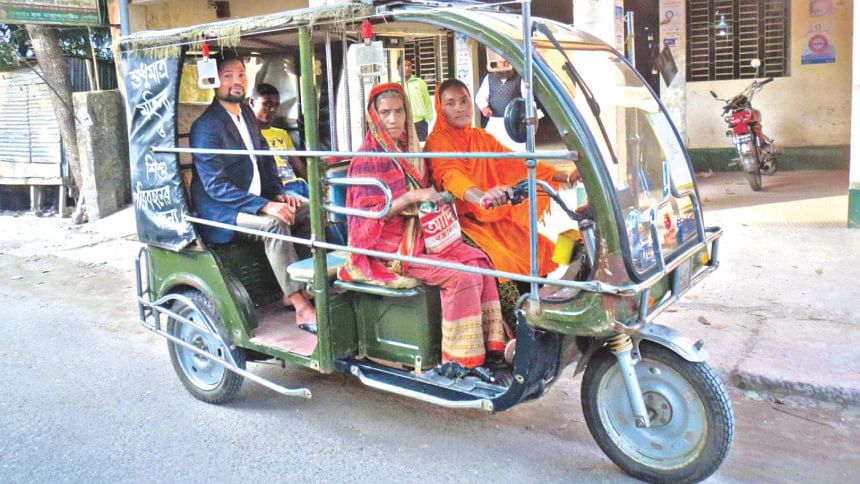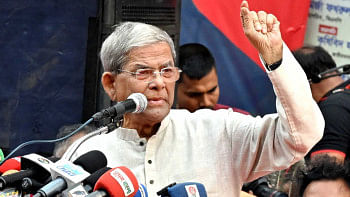Woman at the wheel

Shapna Rani presents quite an unlikely sight. She is a sight to behold behind the wheel of an auto-rickshaw in the rural neighbourhood of Kurigram.
Growing up in a community where women are discouraged from leaving their homes in pursuit of work, she has broken all glass ceilings to take on the role of caregiver for her daughter who is in grade 6 and son in grade 2.
Shapna was married off young at the age of 12, and had her daughter 10 years later. It was always a struggle for her husband Raton Kumar of Lahnikanto village of Bhangamor union under the Phulbari upazila, who was a day labourer, to make ends meet.
Shapna gave birth to her son a few years later, adding to Raton's financial burdens.
Consequently, he deserted Shapna when her son was a mere three days old. She waited at her in-laws house for him to return for days. But upon realising that he was not going to return, her father Bakshi Chandra Barman of Bhabaipur village, Bhitarbandha union under Nageswari upazila, brought her back home.
While her children were still very young, she passed her days in much hardship, working as a part-time construction worker or house maid to make ends meet.
In August 2015, Shapna was part of a gathering at the Bhitarbandha Union Parishad grounds when she heard a mike announcement by Strengthening Women's Ability for Productive New Opportunities (SWAPNO) Project officials. She applied and was later selected as a beneficiary of the government project for the maintenance of rural roads over a span of 18 months.
She jumped at the opportunity as the project would pay Tk 200 a day, with payments being made every fortnight. However, Tk 50 a day would be pending and paid at the end of the 18-months as a form of forced savings for the beneficiaries.
From 9am to 2pm, her job entailed repairing the rural, mud roads of the union that were mostly affected by rainwater and maintaining the trees and greenery on the roadsides.
Fourteen months into her job, Bhitarbandha Union Parishad Chairman Aminul Haque Khandakar informed the members of a monthly meeting that they will provide a battery-run auto-rickshaw to one woman.
No one stood up to claim the role of a driver, except Shapna.
The chairman arranged driving lessons for her and she was a quick learner.
Abul Kashem Sarker, chairman of Nageswari Upazila Parishad, handed over an auto-rickshaw worth Tk 180,000 to her; the parishad chipped in Tk 105,000 while Shapna had pay Tk 75,000, for which she used up all of her savings and took out a loan.
“The Parishad could have paid the full amount for the auto rickshaw, but we want the beneficiary to be emotionally invested, to grow accountability,” said Sarker.
In November 2016, she first started hauling women and children passengers in her locality in the afternoons. She initially earned Tk 250 to Tk 350 a day, but after gaining experience, she would ride longer distances with both male and female passengers and earn Tk 500- Tk 600 a day.
Since the roads repair project ended in February, she rides from morning till night, earning Tk 800 to Tk 1,000 a day. She repaid the loan upon receiving payment for completion of the 18 month project.
“I have been driving the auto-rickshaw for almost a year now and my fate has changed. On some days, I have to hear lewd comments from men and many women discourage me, but I know that my job pays my bills,” said Shapna.
“I wake early in the morning, cook for my children and send them off to school. I leave some more food covered on the table and they return from school and eat it until I return and prepare the next meal at night for them. We have struck a balance to make it work,” she added.
ABM Khurshid Alom, executive engineer of the Department of Roads and Highways in Kurigram, said battery run vehicles are not allowed to ply the highways and national roads; however, they are allowed on all regional and district roads.
The 32 year old said, “I haul passengers between Nageswari, Bhurungamari, Phulbari and Kurigram Sadar upazilas. I have saved up some money and will buy a pick-up van if I get some help from the government or non-government organisations. I will then have to apply for a driving licence.”
“Women should not hesitate to take up driving as a profession. Critics will criticise, no matter what. We should ignore and move on,” she said.
Mohammad Waznabi, Traffic Inspector of Kurigram district police, said, “I have observed Shapna hauling passengers on the roads. She is brave and does her job well. It is a positive message for the women in district.”

 For all latest news, follow The Daily Star's Google News channel.
For all latest news, follow The Daily Star's Google News channel. 



Comments